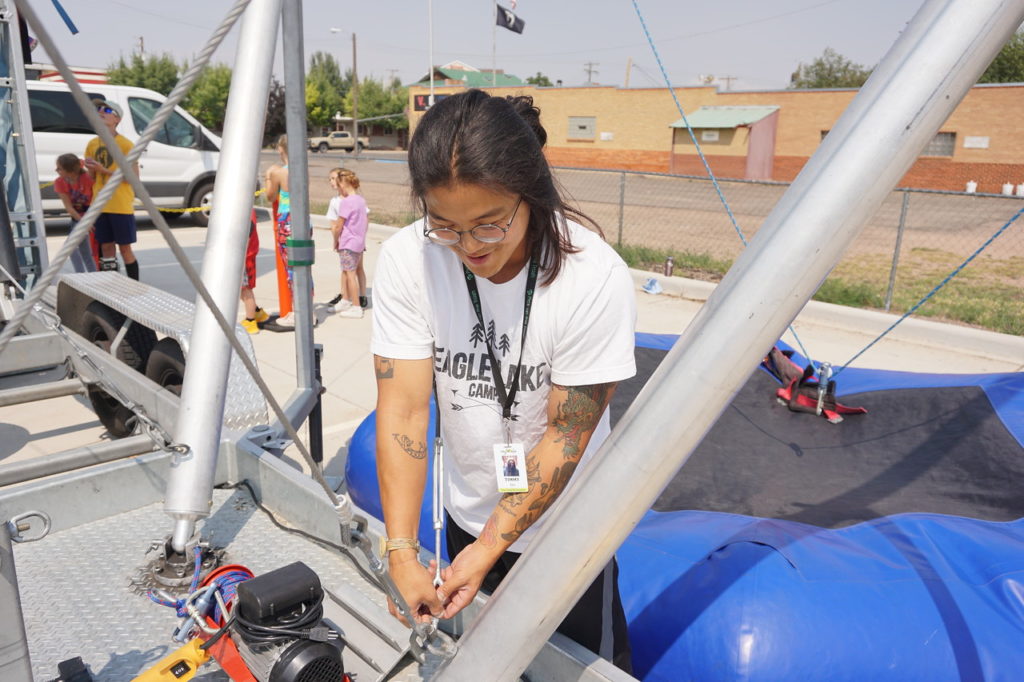Hey Everyone! I’m Roger Hamilton and I oversee the training and development of our Eagle Lake staff. I have been with the Navigators for 33 years! I love helping our staff grow in their knowledge and love of God and the Bible. One thing I don’t like are blogs. So, I prefer to call it a B-Log, as in Bible log. I’ll be back as your trusty Eagle Lake B-logger every other week, at least until you get sick of me. Did you miss the last post? Read it here!
-Roger that!
The Big Rock of Discipleship: Devotional
A few weeks ago, we looked at young David’s choice to grab 5 smooth stones and his sling to conquer Goliath, rather than the heavy, unwieldy armor of Saul. As we focus on how to help our Eagle Lake staff grow in Christ this spring, we’re highlighting a series of key concepts in discipleship using this theme. So here we go with The Five Smooth Stones of Discipleship.
#1 STONE: DEVOTIONAL- the goal is to draw us closer to Christ.
Discipleship is all about spending time with Jesus! In Mark 3:14 we read that Jesus, “appointed twelve – designated them apostles- that they might be with him and that he might send them out to preach.” The big idea of being a disciple was that they were WITH HIM. After Jesus returned to the Father that investment was affirmed in Acts 4:13: “When they saw the courage of Peter and John and realized that they were unschooled, ordinary men, they were astonished and they took note that these men had been with Jesus.” And while we want to focus on spending time with Jesus on a daily and consistent basis, it really moves us toward the ultimate goal expressed in 1 Thessalonians 4:17, “and so we will be with the Lord forever.”
You may have noticed that David only needed one rock to defeat Goliath. While we’re going to talk about five smooth stones, the rest are all just providing back up for this one. Everything we do in our personal growth as Christians and our investment in others should point back to this: spending time with Jesus. Jerry Bridges, long-time Navigator and best-selling author, was fond of saying that the Wheel Illustration wasn’t drawn to scale. There should be a really big hub (Christ the Center), with very little spokes (all the things we do to know Christ better).
My fondest memories from my college days are of the personal retreats I took with my friend Dave. On a bitterly cold Wisconsin winter night, Dave would load up his tiny Toyota and take me out to a peaceful farm in the country. We would trudge through waist-deep snow to a little one room cabin with a wood-burning stove and a small sleeping loft. Keeping warm by the fire, with only a Bible and a journal, Dave taught me the importance of spending time with God. It was so impactful that for years after I would take men I discipled to that same cabin.
Whether we call it a Quiet Time, Daily Devotional, or something else, a daily time with God is essential for any follower of Christ. We may need the encouragement ourselves, or we might be thinking how to help someone else. Either way, It really doesn’t matter how long or how sophisticated we make it. To get started, consider 7-10 minutes following this simple formula: Pray-Read-Pray:
- Pray before you begin reading, asking the Holy Spirit to reveal the Father’s character to you.
- Read a verse or paragraph or chapter, whatever you have time for.
- Pray again, either telling the Father what stood out to you, or if nothing did (it’s not failure, it happens!), praising what you know to be true of His character or asking for guidance.
If the only thing I ever do with a young believer is to help them spend time every day praying and reading the Bible, that will be a win! Of course, we’re going to learn to go beyond that as we move them toward maturity in Christ. But daily connecting with God and abiding in Christ is THE big rock in discipleship.
Read questions and Journal!
1. Have you developed the habit of spending time each day with God? Try using Pray-Read-Pray with a chapter each day in the Gospel of John.
2. Do you have a favorite format you like to use? CLICK HERE FOR A RESOURCE YOU COULD TRY.
3. What about a reading plan? CLICK HERE FOR A READING PLAN IDEA.
4. Have you considered a prayer guide or journal? CLICK HERE FOR PRAYER JOURNAL RESOURCES.
5. Have you considered a monthly or quarterly Day Alone With God (DAWG) or half-day (HOTDAWG)? CLICK HERE FOR DAWG RESOURCES.




